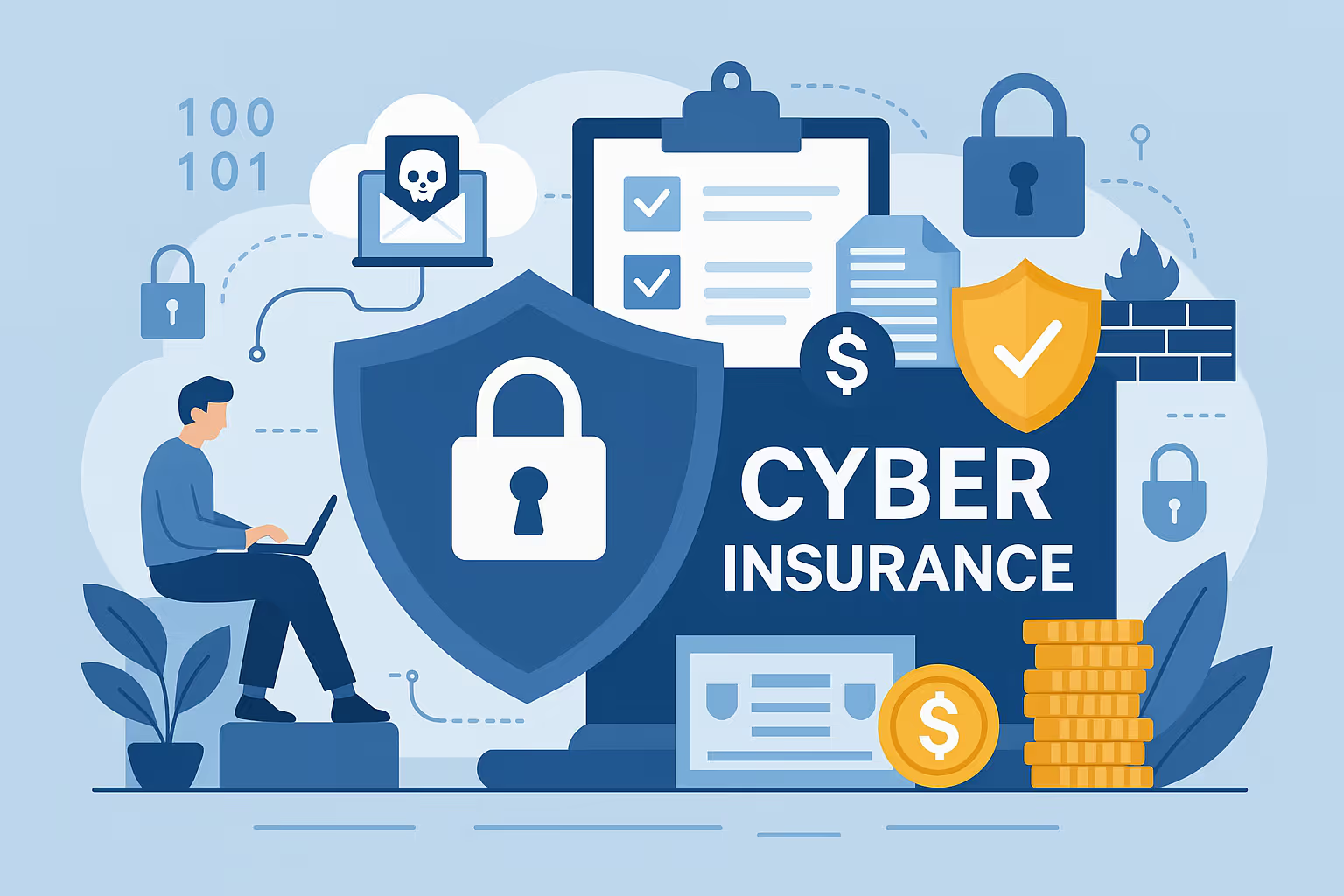
How to get...
Obtaining cyber insurance in the Construction / Real Estate sector involves a sequence of deliberate steps designed to assess your company’s specific cyber risks and provide tailored coverage. This guide explains how to get cyber insurance for Construction / Real Estate in the United States with simple, actionable steps:
Each stage—from risk assessment to ongoing management—plays a pivotal role in demonstrating your commitment to cybersecurity, which in turn can lead to more favorable premiums and better overall protection in your industry.

Who provides...
Organizations evaluating cyber insurance providers for Construction / Real Estate in the United States should focus on several key elements:


Why need...
Integrating robust cyber insurance solutions, such as cyber insurance for Construction / Real Estate, provides vital coverage that addresses immediate incident response, data recovery, business interruption loss, and legal fees. This protection enables organizations to manage risks effectively, focus on their core operations, and confidently pursue new business opportunities in a highly digitized environment.
Cyber insurance coverage for Construction / Real Estate in this category addresses the costs associated with unauthorized access to client, employee, or project-related data. This coverage includes:
This coverage is crucial for construction and real estate organizations that store sensitive project plans, financial records, and personal data. It mitigates the risk of reputational damage and ensures rapid compliance with data breach regulations while protecting financial security.
Cyber insurance coverage for Construction / Real Estate under Business Interruption focuses on losses incurred due to a cyber event that disrupts normal operations. Key inclusions are:
This coverage is vital because project delays or disrupted communications can lead to significant financial setbacks and contractual complications, impacting both operational efficiency and compliance with project deadlines.
Cyber insurance coverage for Construction / Real Estate in the cyber extortion realm protects against threats like ransomware attacks, which can paralyze project management systems and financial operations. This protection typically covers:
Given the increasing targeting of construction and real estate digital assets, this coverage is essential for maintaining operational continuity, mitigating financial risks, and ensuring compliance with contractual and regulatory obligations.
Cyber insurance coverage for Construction / Real Estate in this area provides support for defending against regulatory investigations and addressing penalties arising from data breaches or cybersecurity lapses. It typically includes:
This coverage is particularly important as construction and real estate organizations must navigate stringent U.S. regulatory environments. It directly impacts financial stability and operational resilience, ensuring that companies can swiftly address legal liabilities while maintaining trust with clients and investors.
Build Security with OCD Tech That Meets the Standard — and Moves You Forward
Contact Us
US Construction/Real Estate firms must meet cyber standards. Underwriting vets IT controls to cut risk. Strong defenses protect assets.
Requirement: Companies must provide detailed written cybersecurity policies and procedures that outline their approach to mitigating cyber risks. This includes encryption use, incident response protocols, and access controls.
Importance: Insurers review these documents to assess the maturity of your cybersecurity framework and to ensure that you have structured defenses in place. They form part of the overall evaluation of cyber insurance requirements for Construction / Real Estate.
Impact: Strong documentation can lead to lower premiums and higher eligibility, while gaps or outdated policies may result in higher rates or even coverage denial.
Requirement: Applicants must demonstrate the implementation of advanced technical security controls, such as firewalls, intrusion detection systems, multi-factor authentication, and regular patch management.
Importance: Insurers assess these measures to gauge the resilience of your network against cyber threats. In the Construction / Real Estate sector, protecting proprietary project data and client information is critical.
Impact: Effective technical controls can reduce risk scores, thereby impacting eligibility favorably and potentially resulting in lower insurance premiums.
Requirement: Companies must supply proof of compliance with relevant cybersecurity regulations and industry standards, such as NIST or ISO frameworks, and any local state requirements.
Importance: This evidence helps insurers understand how well a company adheres to best practices, reducing the likelihood of regulatory fines or breaches. Adhering to cyber insurance requirements for Construction / Real Estate is seen as a proactive risk management strategy.
Impact: Documented compliance can enhance eligibility, leverages risk mitigation and may consequently lead to more favorable premium terms.
Requirement: Applicants need to provide a clear history of past cyber incidents, including details about breaches, responses, and improvements made since each event. An updated incident response plan is also required.
Importance: Insurers analyze past incident history to determine the frequency and severity of breaches, which is vital for risk assessment in cyber insurance requirements for Construction / Real Estate.
Impact: A well-documented incident history and robust response plan may lower the insurer’s perceived risk, thus reducing premiums and enhancing coverage eligibility.
Requirement: Companies must conduct regular risk assessments and provide reports that identify vulnerabilities, particularly those stemming from third-party vendors or subcontractors.
Importance: In the Construction / Real Estate sector, projects often involve multiple external partners. Insurers need assurance that these connections are secure and won’t introduce additional vulnerabilities.
Impact: Demonstrated risk assessment and solid vendor management strategies can be instrumental in negotiating lower premiums and establishing more favorable terms in meeting cyber insurance requirements for Construction / Real Estate.
Secure Your Business with Expert Cybersecurity & Compliance Today
Contact Us


Differences by State...
For organizations in the Construction / Real Estate sector, evaluating cyber insurance for Construction / Real Estate requires an understanding of state-specific regulations that affect coverage, premiums, compliance obligations, and risk management. Each state has its own framework, and knowing these differences helps companies adapt their cybersecurity investments effectively.
These variations impact how organizations evaluate, purchase, and maintain their cyber insurance policies. Specifically, companies must:
By grasping these state-level differences, companies in the Construction / Real Estate sector can strategically choose and manage their policies to protect their assets, ensure compliance, and achieve optimal financial security.

Compliance & Frameworks...
Organizations in the Construction / Real Estate sector face unique cybersecurity challenges due to the integration of project management systems, client data, and connected devices at construction sites or in managed properties. When obtaining cyber insurance for Construction / Real Estate, companies should consider the following major compliance requirements and frameworks:
Compliance with these frameworks and regulations shapes cyber insurance coverage by ensuring adequate risk management practices are in place. Insurers use this compliance information to assess a company’s resilience against cyber threats, which in turn influences both the eligibility for coverage and the premium rates. A strong adherence to standards such as NIST CSF and ISO 27001 demonstrates proactive risk management—a key consideration for lowering risk exposure in the eyes of insurers.

Audit. Security. Assurance.
IT Audit | Cybersecurity | IT Assurance | IT Security Consultants – OCD Tech is a technology consulting firm serving the IT security and consulting needs of businesses in Boston (MA), Braintree (MA) and across New England. We primarily serve Fortune 500 companies including auto dealers, financial institutions, higher education, government contractors, and not-for-profit organizations with SOC 2 reporting, CMMC readiness, IT Security Audits, Penetration Testing and Vulnerability Assessments. We also provide dark web monitoring, DFARS compliance, and IT general controls review.
Contact Info
.svg)
OCD Tech
.svg)
25 BHOP, Suite 407, Braintree MA, 02184
.svg)
844-623-8324
.svg)
https://ocd-tech.com
Follow Us
Videos
Check Out the Latest Videos From OCD Tech!
Services
SOC Reporting Services
– SOC 2 ® Readiness Assessment
– SOC 2 ®
– SOC 3 ®
– SOC for Cybersecurity ®
IT Advisory Services
– IT Vulnerability Assessment
– Penetration Testing
– Privileged Access Management
– Social Engineering
– WISP
– General IT Controls Review
IT Government Compliance Services
– CMMC
– DFARS Compliance
– FTC Safeguards vCISO